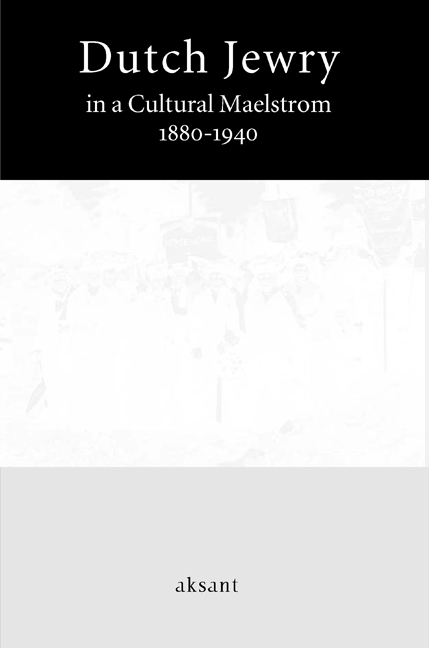Book contents
- Frontmatter
- Contents
- Foreword
- The New “Mosaik”: Jews and European Culture, 1750-1940
- The Politics of Jewish Historiography
- “The First Shall be the Last”: The Rise and Development of Modern Jewish Historiography in the Netherlands Until 1940
- Epigones and Identity: Jewish Scholarship in the Netherlands, 1850-1940
- Judaism on Display: The Origins of Amsterdam's Jewish Historical Museum
- De Vrijdagavond as a Mirror of Dutch Jewry in the Interbellum, 1924-1932
- “Holland is a Country which Provokes Serious Reflection…”: Images of Dutch Jewry in the German Jewish Press
- Spinozism and Dutch Jewry between 1880 and 1940
- Spinoza's Popularity in Perspective: A Dutch-German Comparison
- Mozes Salomon Polak: Jewish “Lerner” and Propagator of Freemasonry, Spiritualism, and Theosophy
- Jewish Women, Philanthropy, and Modernization: The Changing Roles of Jewish Women in Modern Europe, 1850-1939
- Roosje Vos, Sani Prijes, Alida de Jong, and the others: Jewish Women Workers and the Labor Movement as a Vehicle on the Road to Modernity
- Stemming the Current: Dutch Jewish Women and the First Feminist Movement
- Dutch Jewish Women: Integration and Modernity
- Index of Names of Persons
- Index of Subjects
Mozes Salomon Polak: Jewish “Lerner” and Propagator of Freemasonry, Spiritualism, and Theosophy
Published online by Cambridge University Press: 26 January 2021
- Frontmatter
- Contents
- Foreword
- The New “Mosaik”: Jews and European Culture, 1750-1940
- The Politics of Jewish Historiography
- “The First Shall be the Last”: The Rise and Development of Modern Jewish Historiography in the Netherlands Until 1940
- Epigones and Identity: Jewish Scholarship in the Netherlands, 1850-1940
- Judaism on Display: The Origins of Amsterdam's Jewish Historical Museum
- De Vrijdagavond as a Mirror of Dutch Jewry in the Interbellum, 1924-1932
- “Holland is a Country which Provokes Serious Reflection…”: Images of Dutch Jewry in the German Jewish Press
- Spinozism and Dutch Jewry between 1880 and 1940
- Spinoza's Popularity in Perspective: A Dutch-German Comparison
- Mozes Salomon Polak: Jewish “Lerner” and Propagator of Freemasonry, Spiritualism, and Theosophy
- Jewish Women, Philanthropy, and Modernization: The Changing Roles of Jewish Women in Modern Europe, 1850-1939
- Roosje Vos, Sani Prijes, Alida de Jong, and the others: Jewish Women Workers and the Labor Movement as a Vehicle on the Road to Modernity
- Stemming the Current: Dutch Jewish Women and the First Feminist Movement
- Dutch Jewish Women: Integration and Modernity
- Index of Names of Persons
- Index of Subjects
Summary
Doing research can be a true whodunit in the style of an Agatha Christie mystery story. The one you suspect the least, turns out to be the perpetrator in the end. The same principle applies to the subject of my paper, Mozes Salomon Polak. My research on Polak originates in my research on the early roots of the Theosophical Society in Holland. As an art historian, I investigate the influence of theosophy on art between 1880 and 1920. I therefore was interested in those movements in society that led to the foundation of the Dutch Theosophical Society in 1891: which ideologies and which circles played a decisive role as forerunners of theosophy?
Working backwards in history, I came upon an early theosophical lodge bearing the name Post Nubila Lux (after the clouds the sun), which was founded in The Hague in 1880. To my surprise, I also found references to a masonic lodge bearing the same name that existed about thirty years earlier. The masonic lodge Post Nubila Lux happens to be closely related to a freethinkers society called De Dageraad (the dawn), that became famous in Holland. Thus studying the vast literature on this society seemed a good starting point. It is here that the thriller about Mozes Salomon Polak actually begins.
In the literature on De Dageraad, Mozes Polak is mentioned only fleetingly. But as my art historical research has made me very wary of anything written down as “the official history”, I started my research simply by identifying all persons mentioned in the literature on De Dageraad by genealogical methods. It appeared that, up to this day, researchers have not even identified Polak by his rightful name: most often he is called Marcus Samuel, or any other combination based on his first initials. Consequently, anyone seeking to position Polak in the Amsterdam of the 1850s will return from the City Archives of Amsterdam disappointed. There simply is no Marcus Samuel Polak corresponding to the general information available on him. However, it is rather simple to look up his address in the register of addresses of the 1850s, and to subsequently examine the Public Records to match the address to his name and date of birth. Additionally, when browsing through library catalogues, it is very hard to miss Polak's presence: he published some twenty books.
- Type
- Chapter
- Information
- Dutch Jewry in a Cultural Maelstrom1880-1940, pp. 131 - 138Publisher: Amsterdam University PressPrint publication year: 2008



